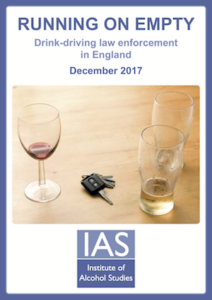View this report

Drink-driving deaths and casualties have flat lined in the UK since 2010 with around 240 deaths and more than 8,000 casualties reported every year.
England and Wales have one of the highest drink drive limits in the world – 80mg alcohol per 100ml blood. Evidence suggests reducing this to 50mg/100ml will reduce drink-driving, saving at least 25 lives and 95 serious casualties each year.
Despite this, Government maintain ‘rigorous enforcement’ of the current limit alone will better address this problem.
This position is questionable in light of this report’s findings, which suggest enforcement activity has fallen over the last five years. FOI requests and published data from police forces in England reveal:
- The number of dedicated Roads Policing Officers reduced by 27% between 2011/12 and 2015/16.b
- The average roads policing budget for forces steadily declined since 2011/12, from £5.3m to £4.35m in 2015/16, a 17.9% (or £0.95m) loss per force.
- There were 25% fewer breath tests in 2015 than in 2011 – a drop of 149,677 breath tests. d If breath testing had been maintained at 2011 levels, there would have been 260,681 more breath tests performed during this period.
While it is clear that a lower limit alone is not an alternative to enforcement, the evidence is clear – a 50mg/100ml limit will save more lives and prevent more causalities than one of 80mg/100ml, with the same levels of enforcement. At a time when police budgets are stretched, frontline officers find themselves performing duties of other services, and forces are asked to do more with less, lowering the drink drive limit offers a cost-effective, compassionate step the UK Government can take to protect the public and relieve pressure on their increasingly embattled forces.
View this report
